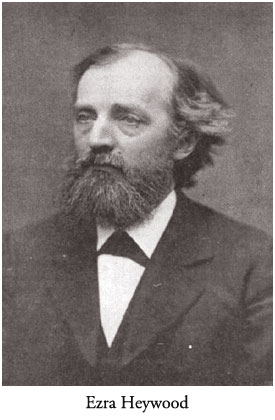Ezra Heywood facts for kids
Quick facts for kids
Ezra Heywood
|
|
|---|---|
 |
|
| Born |
Ezra Hervey Heywood
September 29, 1829 United States
|
| Died | May 22, 1893 (aged 63) United States
|
| Occupation | Activist, abolitionist |
| Spouse(s) | Angela Heywood |
Ezra Hervey Heywood (/ˈheɪˌwʊd/; September 29, 1829 – May 22, 1893) was an American individualist anarchist, slavery abolitionist, and advocate of equal rights for women.
Contents
Philosophy
Heywood saw what he believed to be a disproportionate concentration of capital in the hands of a few as the result of a selective extension of government-backed privileges to certain individuals and organizations.
He believed that there should be no profit in rent of buildings. He did not oppose rent, but believed that if the building was fully paid for that it was improper to charge more than what is necessary for transfer costs, insurance, and repair of deterioration that occurs during the occupation by the tenant. He even asserted that it may be incumbent on the owner of the building to pay rent to the tenant if the tenant keeps his residency in such a condition that saved it from deterioration if it were otherwise unoccupied. Heywood believed that title to unused land was a great evil.
Activism
Heywood's philosophy was instrumental in furthering individualist anarchist ideas through his extensive pamphleteering and reprinting of works of Josiah Warren, author of True Civilization (1869), and William B. Greene. In 1872, at a convention of the New England Labor Reform League in Boston, Heywood introduced Greene and Warren to eventual Liberty publisher Benjamin Tucker.
Heywood co-founded the New England Labor Reform League in 1869 with individualist anarchist William Batchelder Greene. The league advocated for the "abolition of class laws and false customs, whereby legitimate enterprise is defrauded by speculative monopoly." and favored "[f]ree contracts, free money, free markets, free transit, and free land".
In May, 1872 Heywood, a supporter of women's suffrage, began editing individualist anarchist magazine The Word from his home in Princeton, Massachusetts. He was convicted of violating the 1873 Comstock Act and was sentenced to two years' hard labor.
Unlike Bennett, Heywood was pardoned after six months by President Rutherford B. Hayes in response to massive protests by sympathizers and free speech advocates. Arrested four more times following his release, Heywood died of tuberculosis within a year of his final release from prison.
Personal life
Heywood met his wife Angela Heywood through her work in the abolitionist movement. They had four children together named Psyche, Angelo, Vesta, and Hermes.
See also

